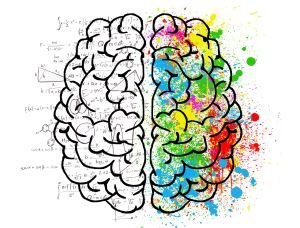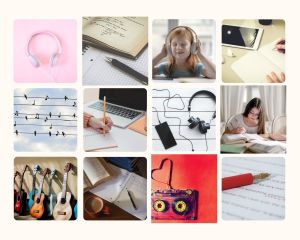Many people listen to music while they study, but does music really help students to focus better on their studies or is it more of a distraction than they realize?
“[Music] helps me concentrate,” Jaclyn Ferrilli, freshman secondary education and mathematics major, said. “It’s not distracting and it allows me to focus better.”
Ferrilli regularly listens to either classical or country music when she studies. She believes that music can help people with concentration when studying, but she admits that music can also be a distraction to her instead of helping her.
“I try changing the music or taking a walk and coming back to it,” Ferrilli said.
Ferrilli has Attention-Deficit/Hyperactivity Disorder (ADHD), which causes people to have problems with paying attention, hyperactivity, impulsiveness, controlling their emotions and staying organized.
“It just makes it harder because it’s harder to concentrate,” Ferrilli said.

According to Dr. Masha Godkin, who is a professor at Northcentral University in the department of marriage and family science, music has the ability to simultaneously activate both the left and right sides of the brain, which “can maximize learning and improve memory.”
Eva Amsen, a writer for Medium, wrote an article debating whether or not music can be helpful for students when they’re studying. In her article, Amsen discusses the “arousal-mood hypothesis,” which is the idea that when people listen to upbeat music with fast tempos, their problem-solving skills can be improved.
“The researchers who first tested this hypothesis used the same Mozart sonata in either a faster or slower tempo, and in a major or minor key, so that all study participants heard the same piece of music, but with different characteristics,” Amsen wrote in her article. “They found that the faster, major-key version of the piece had a positive effect on solving a spatial task.”
Amsen also mentions a second study in her article that found that happy music had the same effect on creative problem-solving skills.
“This is another aspect of how music affects learning: by changing the way we feel while we study,” Amsen wrote.
Researchers have conducted multiple studies that have shown that listening to music that brightens a person’s mood helps them to study better. Timothy Byron, a lecturer in psychology at the University of Wollongong, wrote in his article “Curious Kids: is it OK to listen to music while studying?” that the correlation between human emotion and music was discovered shortly after the Mozart effect theory was debunked.
“You may have heard of the Mozart effect – the idea that listening to Mozart makes you ‘smarter.’ This is based on research that found listening to complex classical music like Mozart improved test scores, which the researcher argued was based on the music’s ability to stimulate parts of our minds that play a role in mathematical ability,” Byron wrote. “However, further research conclusively debunked the Mozart effect theory: it wasn’t really anything to do with maths, it was really just that music puts us in a better mood.”
It is assumed by Byron that listening to music that puts people in a better mood helps people to focus more on their studies.

However, like Ferrilli said, music can help people study but can also be a distraction.
According to Byron, people use their “working memory” when they study, which refers to memorization of information and holding onto that information. Background music, especially when it has lyrics, the working memory is disrupted and doesn’t work as well.
So what’s the best way to listen to music while studying?
It seems that most researchers believe that it’s best to listen to classical music or music that puts you in a good mood, songs that aren’t too fast or too loud and the less words the better.
Ferrilli said that classical music helps her to concentrate when she studies. She also mentioned that music calms her down as well when she studies.
Under the right circumstances and carefully crafting the right playlist, music can be very helpful for studying.



